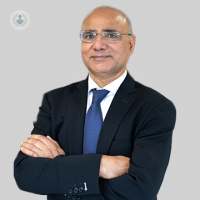Endometriosis: How is it diagnosed and what are my treatment options?
Escrito por:Endometriosis is a chronic and often painful condition that affects millions of women worldwide. It occurs when tissue similar to the lining inside the uterus, known as the endometrium, begins to grow outside the uterus. In his latest online article, consultant gynaecologist Mr Mohammad Masood provides a comprehensive understanding of endometriosis, its symptoms, treatment options, and associated risks or complications.

What are the symptoms of endometriosis?
Symptoms of endometriosis can vary widely among women. Some may experience severe symptoms, while others might have mild or no symptoms at all. Common symptoms include:
- Pelvic pain: Often associated with menstrual periods, but can also occur at other times.
- Dysmenorrhea: Painful periods that may begin before and extend several days into the menstrual cycle.
- Dyspareunia: Pain during or after intercourse.
- Dysuria and dyschezia: Pain with urination or bowel movements, particularly during menstrual periods.
- Heavy menstrual bleeding: Including bleeding between periods.
- Infertility: Endometriosis is found in 20-40% of women who are infertile.
Other symptoms can include fatigue, diarrhoea, constipation, bloating, and nausea, particularly during menstrual periods.
How is endometriosis diagnosed?
Diagnosing endometriosis typically involves a combination of methods. Initially, a healthcare provider will review the patient's medical history and conduct a pelvic exam to check for abnormalities.
Imaging tests such as ultrasound or MRI can help identify cysts associated with endometriosis. However, the most definitive diagnostic method is laparoscopy, a minimally invasive surgical procedure. During laparoscopy, a surgeon inserts a thin tube with a camera into the abdomen to directly visualize and potentially biopsy endometrial-like tissue. This procedure not only confirms the diagnosis but also allows for the assessment of the extent and severity of the condition.
How is endometriosis treated?
While there is no cure for endometriosis, several treatments can help manage the symptoms and improve quality of life. Treatment options include:
Medications
- Pain relief: Over-the-counter pain relievers, such as nonsteroidal anti-inflammatory drugs (NSAIDs), can help reduce menstrual cramps and pelvic pain.
- Hormone therapy: Hormonal treatments aim to reduce or eliminate menstruation, thereby reducing the growth and shedding of endometrial-like tissue. Options include:
- Birth control pills, patches, and vaginal rings.
- Gonadotropin-releasing hormone (Gn-RH) agonists and antagonists.
- Progestin therapy.
- Aromatase inhibitors.
Surgical options
- Laparoscopy: A minimally invasive surgery to remove as much endometrial tissue as possible. It is also used to diagnose endometriosis definitively.
- Hysterectomy: In severe cases, removal of the uterus and possibly the ovaries might be considered, particularly if other treatments have not been effective.
Alternative therapies
Some patients find relief through complementary therapies such as acupuncture, dietary changes, physical therapy, and regular exercise. While these do not treat the underlying condition, they may help manage symptoms.
Risks and complications
Endometriosis can lead to several complications, including:
- Chronic pain: Persistent pain can significantly affect the quality of life.
- Infertility: Endometriosis is a common cause of infertility.
- Ovarian cysts: Endometriomas can form on the ovaries.
- Adhesions and scar tissue: Can cause organs to stick together, leading to pain and complications with organ function.
- Emotional and mental health: Chronic pain and infertility can contribute to stress, anxiety, and depression.
Endometriosis is a complex condition with a variety of symptoms and treatment options. Early diagnosis and a tailored treatment plan are crucial in managing the symptoms and improving the quality of life for those affected.
If you suspect you have endometriosis, you can book a consultation with Mr Mohammad Masood today via his Top Doctors profile.


